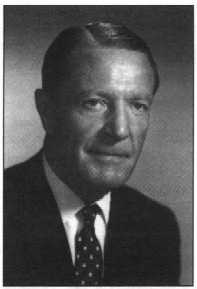 Return to George Champion page  Return to Hopkins Institute main page Read other tributes John Ahlgren Gregory Fossedal Jeffrey Hart |
Tribute to Banking's ChampionBy Paul Craig RobertsThe rush of time carries us past many landmarks. Some we notice and some we don't. On Sept. 16 a big one passed, George Champion, our last banker from the financial integrity school, died at age 93 peacefully at home. Born in Normal, Ill., in 1904, Mr. Champion rose from an assistant cashier at the Chase National Bank to Chairman and CEO of Chase Manhattan. During 1961-1969 when he ran the bank, it was rock-solid with a capital ratio of 10 percent and without a single dime invested in loans to Third World governments or bad real estate. Under his leadership, the bank's assets and deposits doubled. Mr. Champion was, in every way, as good as humans come. He was respected not only as a great banker by those who saw him from a distance, but also by those who saw him up close. The week before his death, he celebrated his 69th wedding anniversary with his wife, Eleanor, his college sweetheart. Shirley McCarthy, his secretary for 20 years, reports that Mr. Champion never failed to thank her every evening for her work and to wish her goodnight. If the men and women in public, life had a tiny fraction of George Champion's integrity, there would not be a new government scandal in the news every day. I knew Mr. Champion after he had retired. He was keenly interested in public policy, especially as it impacted what he saw as deteriorating banking standards. When the Third World debt crisis hit in the early 1980s, it became public knowledge that various large banks had seriously overexposed their capital with loans to foreign governments. Mr. Champion was disturbed by the pressures that Federal Reserve chairman Paul Volcker and various Treasury secretaries put on banks to prop up the bad debts with more lending. He testified before Congress and wrote articles in the Wall Street Journal and Los Angeles Times pointing out the conflict of interest inherent in the Federal Reserve's responsibility for both monetary policy and bank examinations. How could a bank examiner, he asked, demand corrective measures for an overexposed capital position when the Federal Reserve itself was encouraging bankers to keep bad loans afloat by lending money to pay interest? Mr. Champion was also disturbed by the shift in regulatory emphasis from the financial soundness of banks to their use as cash cows for government. In the early 1980s the comptroller of the currency criticized banks for writing off bad loans and building reserves on the grounds that these actions reduced taxable profits. Mr. Champion noted that if the comptroller's idea was that the banks should be run to maximize short-run tax revenues for the Treasury, the banks would be prevented from building up their reserves against the inevitable losses and would fail. He reminded policymakers that one reason the banks were in trouble was that "reformers" had succeeded over the previous decade in converting loan-loss reserves, which strengthened the banks' capital positions, into taxable profits. The banks' reserves were siphoned into the Treasury just in time to leave the banks vulnerable to the real estate and Latin American debt busts. Mr. Champion was opposed to the Bush-era "reform" permitting interstate branch banking. He thought it would kill banking's important function of identifying and nurturing local talent, the entrepreneurs on whose backs the country was built. The manager of a local branch would be interested in moving on to a bigger branch, not in developing the long-term relationships that produce business successes. Moreover, in order to evaluate the manager's performance, the distant home office would have to rely on standardized practices that would make it risky for branch managers to bet on promising people and ideas. To the claim that national branch banking would let banks diversify their risks by lending in different markets, Mr. Champion dryly replied that the worldwide diversification practices of the big New York banks is what got them into trouble. He thought a banker who couldn't judge his local market would not succeed in judging distant ones. Mr. Champion believed that federal deposit insurance meant the eventual end of our free competitive banking system. Deposit insurance removed the need for banks to be well-capitalized in order to reassure depositors, and by shifting responsibility to taxpayers, the insurance invited increased government supervision and control. The freedom of banks, he noted, rests on their soundness and the care with which they are managed. The truth of his observation survives him. Paul Craig Roberts is a columnist for The Washington Times. |